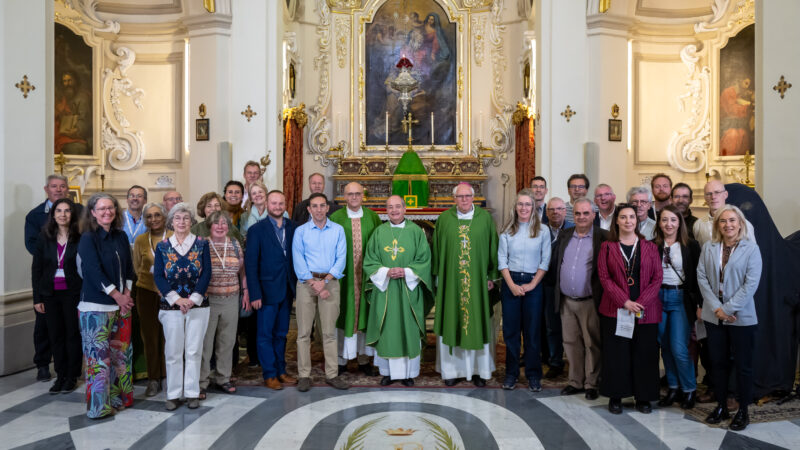Homily by Bishop Joseph Galea-Curmi (The Chapel of Our Lady of Manresa at the Archbishop’s Curia, Floriana, 13/11/2023)
The first words in today’s readings are: “Love justice” (Wisdom 1:1). In his Encyclical Fratelli Tutti, Pope Francis emphasizes that peace is built on justice. It is proactive, and aims at forming a society based on service to others and on the pursuit of reconciliation and mutual development (cf Fratelli Tutti, 229).
We have heard in the Gospel Jesus speaking about forgiveness, and saying: if your brother offends you and asks you pardon, forgive him; and if he offends you seven times in a day and says he is sorry, forgive him again and again” (cf Lk 17:3-4). Forgiveness is linked to peace: we must love everyone, without exception. We know that it is not easy to forgive, but we also understand the fact that forgiveness is not a question of feelings but it’s a choice. Even if you have a lot of bad feelings, you choose to forgive – that is, not to inflict pain on those who hurt you, not to insult those who insult you.
However, Pope Francis makes a very important point on forgiveness and its link to justice. Loving an oppressor means helping him to change and not allowing him to continue oppressing his neighbour (cf Fratelli Tutti, 241). Forgiveness does not mean impunity, but rather, justice and remembrance. To forgive does not mean to forget, but to renounce the destructive power of evil and the desire for revenge. Pope Francis says: never forget horrors like the Shoah, the atomic bombing of Hiroshima and Nagasaki, persecutions and ethnic massacres. They must be remembered always, anew, so as not to become anaesthetized and to keep the flame of collective conscience alive (cf Fratelli Tutti, 247-248).
These are prophetic words. It seems that several people have forgotten the horrors. What has happened in Ukraine following the Russian aggression on 24 February 2022; and in Israel on 7 October 2023, and what is now taking place in Gaza – all are terrible experiences of atrocities and barbarities that strike many innocent civilians, among them many children. I wish to recall the words of Pope Francis, when he visited the Yad Vashem Memorial in Jerusalem (26 May 2014): “Lord, remember us in your mercy. Grant us the grace to be ashamed of what we men have done, to be ashamed of this massive idolatry, of having despised and destroyed our own flesh which you formed from the earth, to which you gave life with your own breath of life. Never again, Lord, never again!”. War represents the negation of all rights, a failure of politics and humanity, and a defeat before the forces of evil.
I encourage you all, representing the Justice and Peace Commissions of Europe, to continue your hard work of advocacy. The Synod synthesis report published recently speaks of the need of actions to protect the rights of all, especially those who are victims, and says: “this may require public denunciation of injustices, whether perpetrated by societal structures or by individuals, corporations or governments” (A Synodal Church in Mission, 4f)
The preferential option for the poor and those at the margins is a choice you have made, and a choice we should all make. We all have a duty to commit ourselves to active participation in building up the common good and defending the dignity of life, drawing inspiration from the Church’s social teaching and working together in various ways.
The Church is deeply grateful to you all who are committed to this service with a genuine spirit of love. Let us view those living in poverty, victims of war and victims of exclusion, not in terms of “them” and “us,” as “objects” of the Church’s charity, but let us put them at the centre and learn from them (Cf A Synodal Church in Mission, 4i). Let us continue to promote the Church’s social teaching through practices that put its inspiration into action.
✠ Joseph Galea-Curmi
Auxiliary Bishop of Malta



